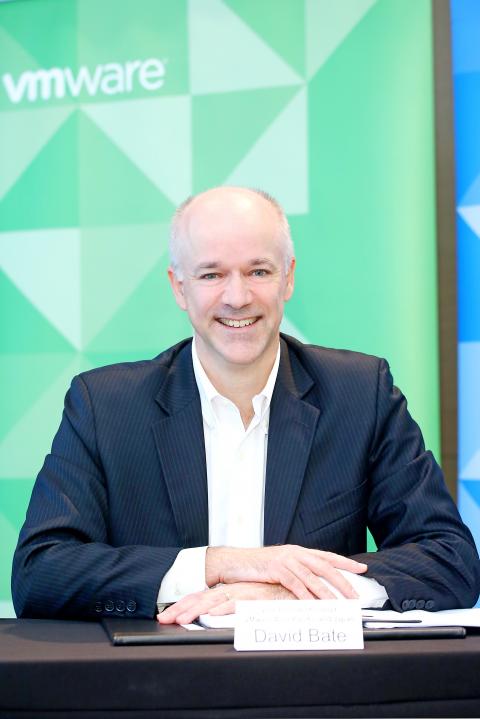The hybrid cloud could be the new force driving the growth of small and medium-sized enterprises (SMEs), VMware vice president of the cloud team in Asia-Pacific and Japan David Bate said yesterday in an interview with the Taipei Times as the company launched its innovative cloud offering in Taiwan.
The new offering, developed in cooperation with Amazon Web Services Inc (AWS), is an on-demand hybrid cloud service that is delivered, sold and supported by VMware and its partners.
Cloud adoption is more advantageous for SMEs along with companies in the innovative and creative industries in Taiwan and Asia, Bate said, as it allows them to reduce information technology-related costs, which is sorely needed for smaller companies and start-ups where resources and skills are scarce.

Photo courtesy of VMware Inc
“[The hybrid] cloud can be a critical enabler for small companies to grow faster... It allows small companies to behave like much larger companies,” Bate said, adding that start-ups could therefore be disruptive for established businesses on a global basis.
“One of the [other] advantages of cloud-based computing is that ... for small companies, they’re able to access some of the value added [application] services like AI [artificial intelligence], machine learning and text-to-speech recognition, for which they may not have the expertise in-house to be able to do themselves,” Bate said.
AWS provides up to 2,000 value-added application services in 165 categories. The enterprise applications are easily accessible through the VMware Cloud on AWS platform.
Cloud-based computing also offers significantly more flexibility for companies, allowing them to change their data center capacity to adapt to rapid changes in market demand, Bate said.
“Traditionally on premises, the ability to make changes is much smaller, if you want to increase capacity or change the capacity that you have that can take many weeks or even months,” Bate said.
In industries such as gaming, retail and finance the demand for data center capacity is elastic, depending on the period of the year and temporary peak periods of workload, Bate said, and VMware Cloud on AWS offers companies “burst” capacity in the hybrid cloud, helping them avoid the heavy costs of building traditional large-capacity data centers.
High-speed migration of a firm’s workload is also part of the VMware Cloud on AWS offering, Bate said, providing the example of a Victoria state government agency in Australia that migrated its complete workload in less than 22 minutes after implementation of the hybrid cloud.
Taiwanese companies looking to move back and invest in the nation amid the US-China trade dispute could also use the hybrid cloud to transit their workload between China and Taiwan while keeping it intact, VMware Taiwan general manager Barry Chen (陳學智) said.
While VMware has not yet established data centers in Taiwan, local clients can access the VMware Cloud on AWS platform in several cities in Asia, such as Tokyo, Singapore and Sydney, the company said.
VMware is working with 12 partners in Taiwan to provide technical support for VMware Cloud on AWS — Chief Telecom Co (是方電訊), Chunghwa Telecom Co (中華電信), Digicentre (果核數位), eASPNet Taiwan Inc (數位通國際), Far EasTone Telecommunications Co (遠傳電信), Genesis Technology Inc (晉泰科技), Odysseus Digital Co (渥達數位), Syscom Group (凌群電腦), Systex Corp (精誠資訊), Taiwan Mobile Co (台灣大哥大), Tatong System Technologies Inc (大同世界科技) and WiAdvance Technology Co (緯謙科技).

Intel Corp chief executive officer Lip-Bu Tan (陳立武) is expected to meet with Taiwanese suppliers next month in conjunction with the opening of the Computex Taipei trade show, supply chain sources said on Monday. The visit, the first for Tan to Taiwan since assuming his new post last month, would be aimed at enhancing Intel’s ties with suppliers in Taiwan as he attempts to help turn around the struggling US chipmaker, the sources said. Tan is to hold a banquet to celebrate Intel’s 40-year presence in Taiwan before Computex opens on May 20 and invite dozens of Taiwanese suppliers to exchange views

Application-specific integrated circuit designer Faraday Technology Corp (智原) yesterday said that although revenue this quarter would decline 30 percent from last quarter, it retained its full-year forecast of revenue growth of 100 percent. The company attributed the quarterly drop to a slowdown in customers’ production of chips using Faraday’s advanced packaging technology. The company is still confident about its revenue growth this year, given its strong “design-win” — or the projects it won to help customers design their chips, Faraday president Steve Wang (王國雍) told an online earnings conference. “The design-win this year is better than we expected. We believe we will win

Quanta Computer Inc (廣達) chairman Barry Lam (林百里) is expected to share his views about the artificial intelligence (AI) industry’s prospects during his speech at the company’s 37th anniversary ceremony, as AI servers have become a new growth engine for the equipment manufacturing service provider. Lam’s speech is much anticipated, as Quanta has risen as one of the world’s major AI server suppliers. The company reported a 30 percent year-on-year growth in consolidated revenue to NT$1.41 trillion (US$43.35 billion) last year, thanks to fast-growing demand for servers, especially those with AI capabilities. The company told investors in November last year that

Power supply and electronic components maker Delta Electronics Inc (台達電) yesterday said it plans to ship its new 1 megawatt charging systems for electric trucks and buses in the first half of next year at the earliest. The new charging piles, which deliver up to 1 megawatt of charging power, are designed for heavy-duty electric vehicles, and support a maximum current of 1,500 amperes and output of 1,250 volts, Delta said in a news release. “If everything goes smoothly, we could begin shipping those new charging systems as early as in the first half of next year,” a company official said. The new